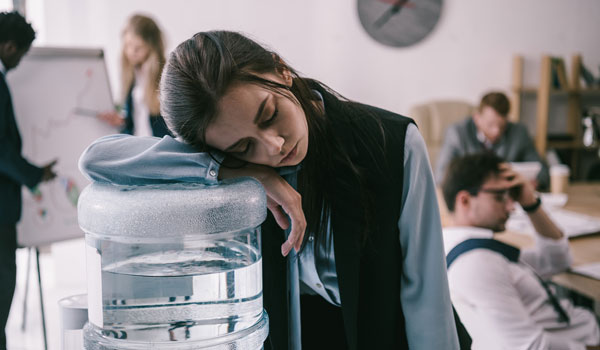
After a long day of work, it is normal to feel tired. But what if you constantly feel tired and drained even after a long night’s sleep? Even though studies show that 1 in 3 adults in the United States report that they don’t get enough sleep at night – lingering tiredness (also called fatigue) is something you should pay attention to.
In most cases, fatigue can be easily resolved by making the necessary lifestyle changes. In other instances, it could be related to a serious health condition. No matter where on the spectrum your fatigue falls, it is important to talk to your doctor first to ensure that your fatigue is not related to a serious health condition. In this post, we discuss reasons why you may be fatigued and what you can do about it.
7 reasons you may always feel tired
A new allergy
Tiredness regularly accompanies allergies. An allergy is an inappropriate immune response to particles that are otherwise harmless to the body. If you have a pollen allergy, then chances are that springtime is never fun for you because of all of the flowers that bloom during that season.
For people who have had a particular allergy for years, you may know your allergies well and be managing them by avoiding the allergens (the trigger for your allergy) and taking medication.
Research, however, shows that people can develop new allergies later on in life. For someone like this, they may not even know they are developing a new allergy or what they are allergic to.
A diet that is high in sugar
Usually, when we are hungry, we’ll grab a bag of chips, a candy bar, or eat something else that is high in sugar. While this can give you a boost of energy, unfortunately, our metabolic systems break sugars down much quicker leaving you with a “sugar crash” just a few hours later. At that point, you might go through the cycle again and grab a food item high in sugar. And the vicious cycle continues.
While your body does need carbohydrates, you can avoid sugar-induced fatigue by eating a balanced diet for your main meals and then eating snacks that are rich in proteins and oils. Your metabolic system tends to “burn” proteins and oils slower than carbohydrates. This means that when you eat snacks that are high in these nutrients, you are less likely to experience a “crash” and feel tired throughout the day.
Pregnancy
For women, extreme fatigue can mean you are pregnant. Most women will experience this extreme fatigue during their first trimester of pregnancy. Pregnancy-related fatigue usually resolves itself once women are out of the first trimester and may return in the latter part of the third trimester of pregnancy.
Lack of quality sleep
You may be sleeping but are you getting quality sleep? If you wake up frequently while you sleep or you get interrupted a lot while you are sleeping, this can also lead to fatigue.
Anemia
When you have anemia, your blood does not carry the required amount of oxygen to your organs. The most common cause of anemia is not having enough iron in your blood. Your body needs iron to make a protein in your body called hemoglobin. Hemoglobin is found in your red blood cells (RBCs) and it is the chemical that carries oxygen within your red blood cells to various parts of your body. When iron is low, not enough hemoglobin is made and therefore the amount of oxygen to your organs is reduced.
Anemia can result from medical conditions like:
- Ulcers
- Pregnancy
- a diet that does not have enough iron, folic acid, or vitamin B12
- Sickle cell and thalassemia
- Colon cancer/polyps
- Inherited/genetic disorders that make a person more likely to have anemia
A person with anemia will experience extreme tiredness no matter how much they rest. Anemia has to be diagnosed by a doctor and it has to be managed medically.
Depression and anxiety
Unexplained fatigue could also be a sign of depression and/or anxiety.
Symptoms of depression include:
- A sense of hopelessness
- Unexplained sadness for two weeks or more
- Some people may be sleeping more now that they are depressed but yet still wake up with low energy
Anxiety is marked by:
- Extreme nervousness
- Difficulty sleeping
- Feeling on “edge” all the time
- Agitation
In both cases, the symptoms associated with depression and anxiety can lead to low energy levels and the inability to properly cope with whatever triggered the condition.
This is exhausting for a person with depression or anxiety and can lead to fatigue as well.
Chronic Fatigue Syndrome
Chronic Fatigue Syndrome (CFS) is a disease where the sufferer has experienced extreme fatigue for at least six months. In CFS, sleeping or resting does not help at all. Individuals with CFS also have problems with memory and focus.
Currently, there is no clear reason why CFS happens. While it can happen to anybody at any age, most people with CFS are young or middle-aged. And the condition is not easy to diagnose. Doctors will have to rule out any other medical condition before a person may be diagnosed with CFS.
If you have been feeling tired a lot lately even after you rest, it may be time to see your doctor. As we mentioned before, while most causes of fatigue could be managed with lifestyle changes, some causes need medical attention.

